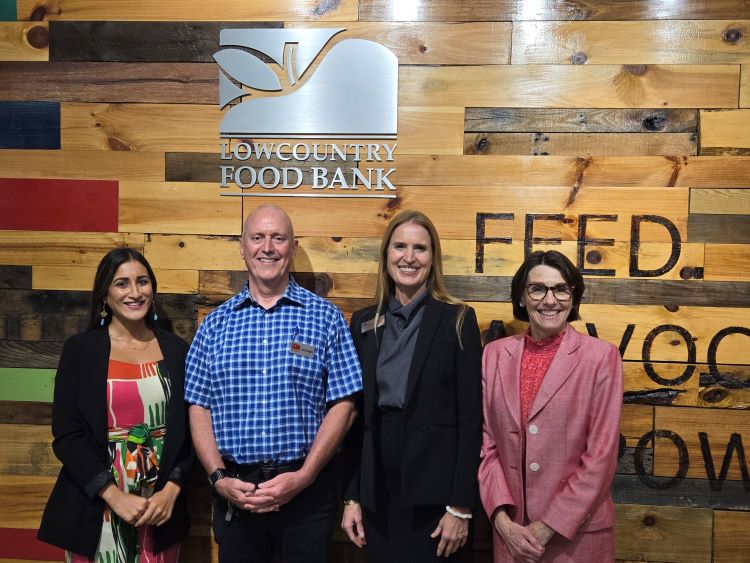USDA Deputy Undersecretary, USDA Special Advisor, USDA State Executive Director visit Lowcountry Food Bank
July 22, 2024
Sanah Baig – Deputy Under Secretary – USDA – Research, Education, and Economics; Nick Osborne – President and CEO – Lowcountry Food Bank; Laurie Funderburk – USDA State Executive Director; Kate Fitzgerald – USDA Senior Advisor for Food Systems
Discuss Ongoing Collaboration with the Local Food Purchase Assistance Program
Lowcountry Food Bank (LCFB) hosted a site visit this month from the United States Department of Agriculture, the South Carolina Department of Agriculture, and South Carolina farmers and growers for a roundtable discussion and Food Bank facility tour.
During the site visit, participants discussed the collaborations, successes, challenges, and continued participation in the Local Food Purchase Assistance Program (LFPA). LFPA is a federal grant program that aims to maintain and improve food and agricultural supply chain strength by supporting local, socially disadvantaged food producers through the purchase of South Carolina food and distribution of that food to underserved populations within our communities.
In addition to increasing consumption of local, healthy, and culturally unique foods, this program aims to help build and expand economic opportunity for the socially disadvantaged producers of South Carolina.
“It was inspiring to visit Lowcountry Food Bank and meet with the small- and mid-sized producers they partner with to enhance nutrition security and economic opportunity across South Carolina,” said Sanah Baig, Deputy Under Secretary for USDA Research, Education and Economics. “The feedback we heard from farmers, cooperatives, and the food bank’s leadership strongly reinforced the importance of USDA’s historic investments in new research and programs, such as the Local Food Purchase Assistance Program, which are creating better markets for producers, keeping food dollars in the local economy, and providing healthy and delicious foods that honor cultural traditions. The cross-sector agricultural partnerships blossoming in the Lowcountry demonstrate that we can build nourishing food systems that create opportunity for all.”
One such collaboration that was strengthened from the LFPA is a partnership between Lowcountry Food Bank and the Gullah Farmers’ Cooperative, which works to:
- Increase the capacity of African American farmers and people of color-led producers to access the wholesale food market
- Expand the membership/suppliers of the Cooperative to include new persons of color-led food producers and farmers
- Establish member services to increase the amount of quality product produced by the participating farmers for Cooperative sales
- Help educate local youth through workshops to bring awareness and interest to farming and our local food ecosystem.
Through this project, the Cooperative will continue to build and expand the local food system infrastructure and promote and advocate for local food procurement equity policies and practices. The collaborative also provides the support and technical assistance needed for new and existing African American-owned farms and people of color to build long-term capacity to increase production, creating sustainability for the farms and the Cooperative.
“Having the opportunity to discuss the successes and challenges of LFPA, together with SCDA, USDA, and local producers highlights the importance of how each stakeholder in this program works together to continue building the LFPA in coastal South Carolina,” said Nick Osborne, President and CEO of Lowcountry Food Bank. “We will continue to advocate for legislation that advances improvement of South Carolina food systems.”
Participants in the Lowcountry Food Bank site visit included USDA and LCFB leadership, several local growers, Gullah Farmers’ Cooperative in St. Helena, the SC Department of Agriculture, SC Black Farmers Coalition, and GrowFood Carolina.
About the Lowcountry Food Bank: Feed. Advocate. Empower.
The Lowcountry Food Bank serves the 10 coastal counties of South Carolina and distributed more than 42 million pounds of food in 2023. The Lowcountry Food Bank strives to unite our community in pursuit of equitable, dignified, and consistent access to food. The organization procures, then distributes food to 240 partner agencies including on-site meal programs, homeless shelters, and emergency food pantries. The Lowcountry Food Bank advocates on behalf of those who experience hunger and helps empower people to make healthy and nutritious food choices. For more information, visit the Lowcountry Food Bank website.




















